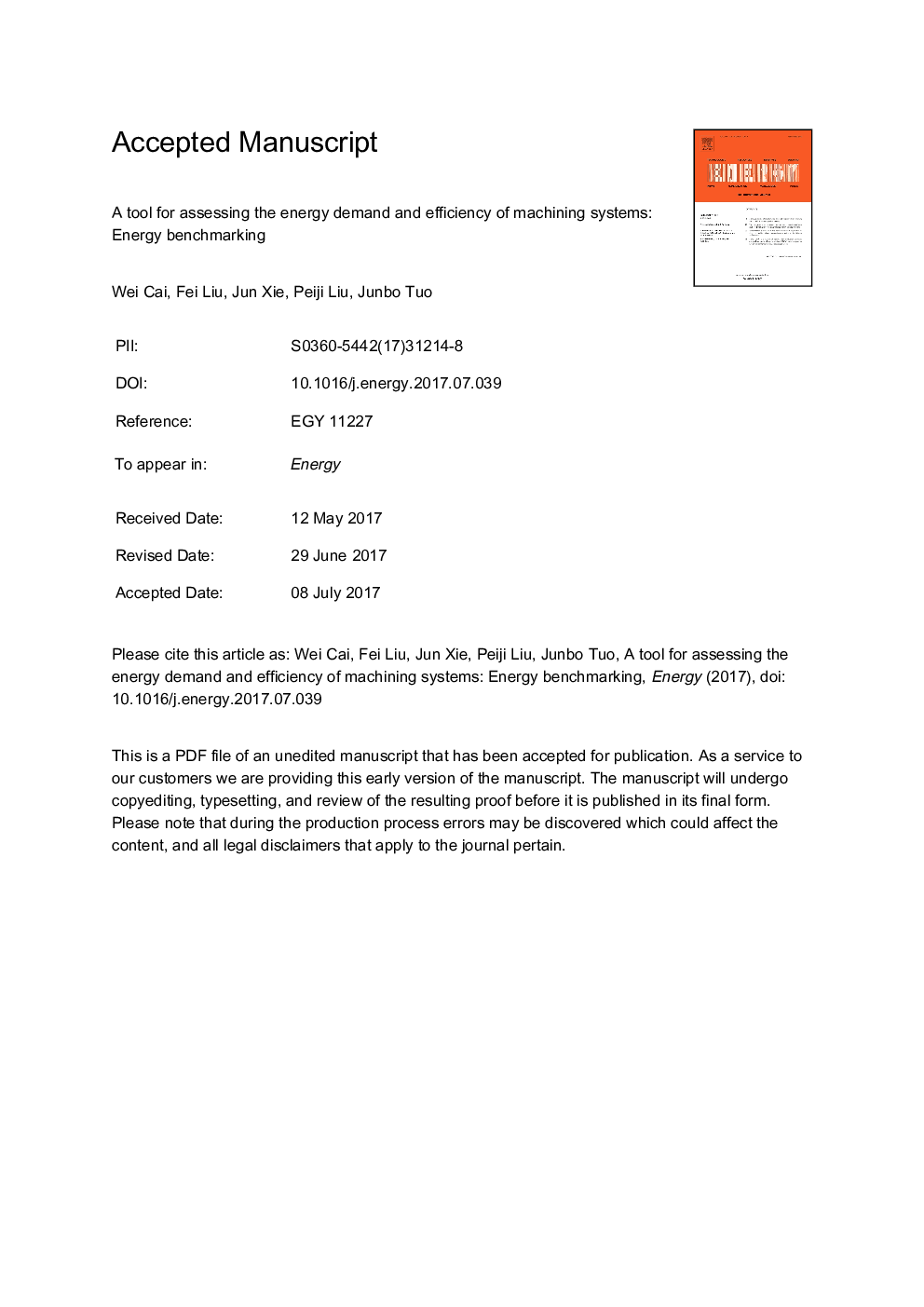| کد مقاله | کد نشریه | سال انتشار | مقاله انگلیسی | نسخه تمام متن |
|---|---|---|---|---|
| 5475501 | 1521413 | 2017 | 33 صفحه PDF | دانلود رایگان |
عنوان انگلیسی مقاله ISI
A tool for assessing the energy demand and efficiency of machining systems: Energy benchmarking
ترجمه فارسی عنوان
یک ابزار برای ارزیابی تقاضای انرژی و کارایی سیستم های ماشینکاری: معیار ارزیابی انرژی
دانلود مقاله + سفارش ترجمه
دانلود مقاله ISI انگلیسی
رایگان برای ایرانیان
کلمات کلیدی
معیار ارزیابی انرژی، سیستم های ماشینکاری، ارزیابی انرژی، تقاضای انرژی، بهره وری انرژی، مصرف انرژی،
ترجمه چکیده
معیار ارزیابی انرژی به عنوان یک روش تحلیلی موثر و مدیریتی برای بهبود کارایی و عملکرد انرژی شناخته شده است. بسیاری از رویکردهای ارزیابی انرژی در زمینه های مختلف مورد استفاده قرار گرفته است. سیستم های ماشینکاری که به طور گسترده ای توزیع شده و مصرف زیادی از انرژی با راندمان پایین دارند، دارای پتانسیل قابل توجهی برای کاهش مصرف انرژی هستند. با این حال، تحقیقات در حال حاضر در رابطه با استفاده از معیارهای ارزیابی انرژی برای سیستم های ماشینکاری به علت پیچیدگی و تنوع فرایندهای مصرف انرژی مورد استفاده در این سیستم ها کافی نیست. در این مقاله، استفاده از معیار ارزیابی انرژی برای تقویت ارزیابی تقاضای انرژی و بهبود کارایی سیستم های ماشینکاری پیشنهاد می شود. اول، رانندگان برای سنجش انرژی و خصوصیات آنها را تحلیل می کند. سپس چارچوب معیار ارزیابی انرژی برای سیستم های ماشینکاری ارائه می شود. سپس مفاهیم ارزیابی انرژی استاتیک، پویا، تک هدف، چند هدفه، مبتنی بر محصول و فرایند را از سه دیدگاه مختلف در نظر می گیریم: حرکت، شی و سطح کاربرد. این یک مبنای تئوریک برای تحقیقاتی برای سنجش انرژی است. در نهایت، روش های توسعه معیارهای ارزیابی انرژی شامل روش پیش بینی، تحلیل آماری و تصمیم گیری متخصص نیز می شود. استفاده از این روش ها به یک کارخانه ماشینکاری واقعی، امکان تجزیه و تحلیل امکان سنجی صرفه جویی در انرژی را از طریق معیار سنجش را فراهم می کند.
موضوعات مرتبط
مهندسی و علوم پایه
مهندسی انرژی
انرژی (عمومی)
چکیده انگلیسی
Energy benchmarking has been recognized as an effective analytical methodology and management tool to improve energy efficiency and performance. Many approaches to energy benchmarking have been applied in various fields. Machining systems, which are widely distributed and consume large amounts of energy with low efficiency, possess considerable potential for reductions in energy consumption. However, current research regarding the use of energy benchmarking for machining systems is insufficient due to the complexity and variety of energy consumption processes used in these systems. This paper proposes the use of energy benchmarking to strengthen the evaluation of energy demand and achieve efficiency improvements for machining systems. First, it analyses drivers for energy benchmarking and their characteristics. Next, an energy benchmarking framework for machining systems is presented. Then the concepts of the static, dynamic, single-objective, multi-objective, product-based, and process-based energy benchmarking are discussed from three different perspectives: the motion, object and application level. This lays a theoretical foundation for further energy benchmarking research. Finally, methods for developing energy benchmarking are also addressed including the prediction method, statistical analysis and expert decision. The application of these methods to a real machining plant allows an analysis of the practicability of potentially saving energy through benchmarking.
ناشر
Database: Elsevier - ScienceDirect (ساینس دایرکت)
Journal: Energy - Volume 138, 1 November 2017, Pages 332-347
Journal: Energy - Volume 138, 1 November 2017, Pages 332-347
نویسندگان
Wei Cai, Fei Liu, Jun Xie, Peiji Liu, Junbo Tuo,
